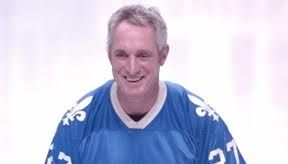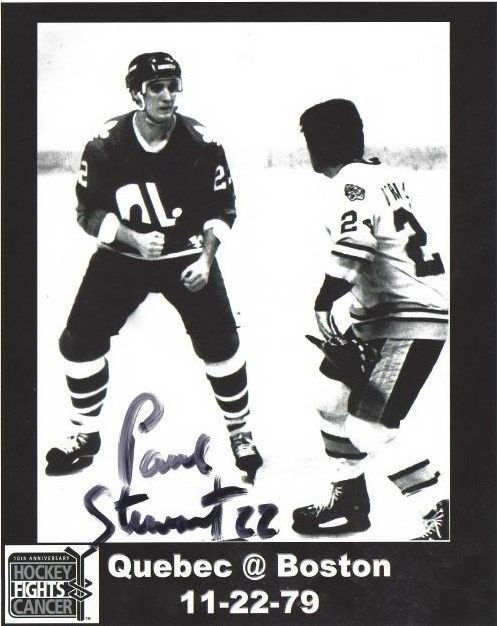Follow Paul on Twitter: @paulstewart22
For those who would mock my eight years as a pro player, think about this: I achieved my goals. I made it to the NHL. This native Bostonian made his NHL playing -- and later, refereeing -- debut in the Boston Garden. I lived the dream that I had since I first put on my sister's too big white skate with toe picks. I even scored a couple goals in the NHL.
I can laugh and joke about my modest skills as a player. The bottom line is that I literally fought my way into the NHL playing fraternity and, however brief it was, that is something special that no one can ever take away from me. Likewise, I am proud to have played for the Quebec Nordiques, even though the franchise has since relocated to Denver.
More and more, it sounds like the NHL is going to expand from 30 to 32 teams in the relatively near future. From what has been said, Seattle and Quebec City may be the top two candidates.
I hope so. I enjoyed Quebec City as both a player and an NHL referee. There are some financial downsides to playing there -- high taxes, for one -- but it is a tremendous city with a passion for hockey. The Nordiques-Canadiens rivalry was a real good one, too. The folks in Quebec City loved their Nordiques and I enjoyed the atmosphere at Le Colisee.
Story time: I'll work backwards chronologically because this anecdote shows just how deep the Quebec fans' passions ran even after the Nordiques became the Colorado Avalanche.
A few years ago, I refereed a Legends Game in Quebec City. An hour or so before the game, I was talking with Mario Lemieux and Mark Messier.
I said, "I will bet you that I get a bigger ovation than either one of you when I'm introduced before the game."
Mario and Mark smirked at each other.
"Yeah, Stewy, whatever you say," Lemieux said.
"No, I'm serious," I said. "Let's make a bet. If I win, you buy me dinner tonight. If I lose, it's my treat."
"You're on," they said.
Pregame introductions rolled around. Messier got a huge ovation. Lemieux got a standing ovation.
I was introduced as the referee. The crowd was silent.
Mario and Messier grinned at me. I put up my hand as if to say, "Wait a second, guys."
I pulled off my referee sweater. Underneath, I wore a Quebec Nordiques jersey with my old number 22 on it. The crowd immediately rose to its feet, roaring its approval. I hammed it up a little, pointing to the Nordiques crest, and they roared even louder.
I skated by Mario. Now it was my turn to grin.
"I think I'll have wine with that dinner," I said.
 Winning my bet, courtesy of my Nordiques sweater!
Winning my bet, courtesy of my Nordiques sweater!
When the NHL merged with the World Hockey Association, one of the terms of the agreement arranged by the WHA Players Association was that all players under WHA contract had to be taken by NHL teams in the ensuing dispersal draft. Legend has it that I was the last player taken.
Whether that's true or not, who cares? All that matters is that Quebec -- one of the teams coming over to the NHL in the merger, along with the Whalers, Jets and Oilers -- took me and I ended up joining the Nordiques in the NHL.
In June of 1979, I was staying with my then-wife at her summer house in New Jersey. I got a phone call from my former Cincinnati Stingers coach, Jacques Demers. Jacques, who had moved on from the Stingers to coach the Nordiques, has always been a caring and loyal person.
"Cat, you're back with me," Demers said.
Training camp was quite the ordeal. The Nords were owned at the time by Carling O'Keefe -- the beer company -- and my first day as a Nord in training camp actually ended with being forced to share an O'Keefe's beer as a peacemaking gesture with Wally Weir in general manager Maurice Filion's office after Weier and I had a vicious fight and he kneed my in the face (I'll tell that story in my upcoming autobiography; there was a lot of back-story and intrigue to it).
Relative to the times and the era, my contract with the Nordiques was a good one. The team agreed to pay me in American dollars, which stretched my money much further in Canada in those days. The exchange rate at that time was about $1.40 Canadian for each U.S. dollar. The simple act of pulling out a wallet with U.S. dollars in it could get you the VIP treatment in stores, restaurants and bars. I even got a signing bonus and my meal money and other expense coverages from the team were also in American dollars. To top it all off, it was a one-way contract, meaning that I got paid the same amount whether I was in the NHL or sent to the minor leagues.
I ended up going back to Cincinnati -- the Stingers franchise had moved to the minor league Central Hockey League when the WHA folded -- to start the season. I barely played. In early November, the team took a road trip and I was told to stay back because I would not be dressing in any of the games.
Quick tangent: Knowing that fighting was my stock in trade, I had been working out as a boxer. I even sparred with future champion Aaron Pryor and other heavyweights and cruiserweights. I already had martial arts background, too, training in the arts of aikido and karate. In later years, some hockey enforcers took to studying other fighting arts to improve their balance and technique. Nowadays, I know mixed martial arts is quite popular among hockey fighters. Back then, I was pretty much the only hockey tough guy who was serious about learning other fighting forms.
I have always agreed with Bruce Lee's philosophy on fighting. When he was developing the martial art of Jeet Kune Do -- with the motto "using no way as way, having no limitation as limitation"-- he constantly emphasized the desirability of studying as many fighting forms as possible and absorbing what is useful to you. Use what works, regardless of "style" or country of origin.
At any rate, playing so infrequently in Cincy and working out so heavily ended up pushing me over the top when the Nordiques needed an enforcer. I made my NHL debut for the Nordiques on Nov. 22, 1979. We were in Boston, and I got the Dorchester Hat Trick (three fights and a game misconduct).
 Fighting Terry O'Reilly in my NHL debut with the Nordiques.
Fighting Terry O'Reilly in my NHL debut with the Nordiques.
Demers and assistant coach Andre Boudrias were wonderful to me during my time with the Nordiques. Boudrias worked hard with me on my skating, which benefited me later on when I became an official.
Just as important, I really enjoyed Quebec City. I spoke very little French at the time -- it would later improve with help from Romeo Leblanc and other friends -- but it was a great city. As I noted earlier, they loved their hockey and were driven to see their team compete against the Habs in particular.
I was refereeing in the NHL when the Nordiques moved to Denver in 1995 and went on to win the Stanley Cup in 1995-96 -- ironically enough, with former longtime Canadiens goalie Patrick Roy as their new goaltender -- in their first year as the Colorado Avalanche. That had to have been a bitter pill to the people in Quebec to lose their team and then see it blossom from an up-and-comer into a champion.
In the years that have followed, Winnipeg lost its NHL team to Phoenix and, years later, got one back when Atlanta folded. Although nothing is set in stone, it sounds like Quebec might also get back a team.
Although the taxes are still high in Quebec, the Canadian dollar has rebounded since the Nordiques relocated. The Colisee is an outdated facility, but there's a new facility under construction with an NHL-friendly seating capacity. Lastly, coming up with a locally-based ownership group to pay all the League fees and operate a financially viable team is also doable.
If and when the NHL returns to Quebec City, I will be happy to see it. Even if it never happens, the city and its hockey community will always hold a special place in my heart.
Merci Beaucoup, Québec!
************
Paul Stewart holds the distinction of being the first U.S.-born citizen to make it to the NHL as both a player and referee. On March 15, 2003, he became the first American-born referee to officiate in 1,000 NHL games.
Today, Stewart is an officiating and league discipline consultant for the Kontinental Hockey League (KHL) and serves as director of hockey officiating for the Eastern College Athletic Conference (ECAC).
The longtime referee heads Officiating by Stewart, a consulting, training and evaluation service for officials. Stewart also maintains a busy schedule as a public speaker, fund raiser and master-of-ceremonies for a host of private, corporate and public events. As a non-hockey venture, he is the owner of Lest We Forget.
Stewart is currently working with a co-author on an autobiography.

